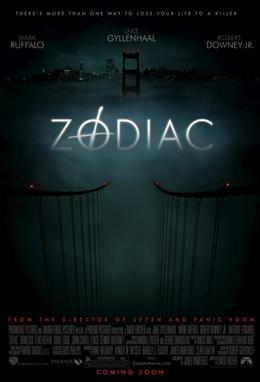Dive deep into David Fincher’s Zodiac (2007), a chilling true-crime thriller that unravels the obsession behind America’s most elusive serial killer. Full review.

🎬 Introduction
David Fincher’s Zodiac (2007) isn’t your conventional serial killer movie. It’s not about jump scares or body counts — it’s about the psychological unraveling that happens when people search too long for answers that may never come. Based on true events and adapted from the book by Robert Graysmith, Zodiac meticulously follows the obsessive manhunt for the Zodiac Killer who terrorized the San Francisco Bay Area in the late 1960s and 1970s.
With a slow-burn narrative, layered performances, and Fincher’s signature precision, Zodiac is one of the most haunting and intelligent thrillers of the 21st century.
🕵️ Plot Summary
The story begins in 1969 with the Zodiac Killer’s infamous attack on a young couple. What follows is a chronicle of the investigation from three angles:
- Paul Avery (Robert Downey Jr.), a crime reporter for the San Francisco Chronicle, who becomes obsessed with the case.
- Detectives Dave Toschi (Mark Ruffalo) and Bill Armstrong (Anthony Edwards), who work the case from the police side with limited leads and increasing pressure.
- Robert Graysmith (Jake Gyllenhaal), a political cartoonist at the Chronicle whose amateur interest in puzzles grows into a personal obsession that spans decades.
While the Zodiac continues to send taunting letters, ciphers, and phone calls, the police and journalists find themselves facing dead ends, bureaucratic delays, and personal breakdowns.
🧠 Themes – Obsession, Truth, and the Cost of Knowing
Zodiac isn’t about resolution — it’s about the human need for answers in a world where they may not exist.
- Obsession is central. Graysmith’s descent from curious cartoonist to obsessed amateur detective reflects how the quest for truth can consume one’s life.
- Uncertainty plagues every scene. Unlike other thrillers, Zodiac offers no definitive closure. Fincher refuses to give viewers a clean, satisfying ending, because reality didn’t have one.
- Time and Memory distort the investigation. As the years pass, memories fade, suspects die, and the trail grows colder. It’s a quiet tragedy that creeps in with every scene.
🎭 Performances
- Jake Gyllenhaal delivers one of his finest early performances as Robert Graysmith, portraying a man whose quiet demeanor masks an obsessive need to uncover the truth. His slow mental unraveling is subtle and deeply human.
- Mark Ruffalo gives Detective Toschi a blend of intensity and weariness, grounding the film’s police procedural arc.
- Robert Downey Jr., pre-Iron Man, adds charisma and chaos to Paul Avery, a journalist slowly disillusioned by the very mystery that once thrilled him.
Together, the trio forms a layered narrative that shifts from external investigation to internal turmoil.
🎥 Direction and Cinematography
David Fincher is known for his meticulous style, and Zodiac may be his most restrained and mature work. Unlike Se7en, which was drenched in stylized horror, Zodiac is grounded in realism.
- Cinematography by Harris Savides captures the era with muted tones, soft lighting, and an eerie quietness. The darkness isn’t flashy — it’s suffocating.
- The pacing is deliberate, sometimes even slow, but always purposeful. Every scene builds tension through silence, long shots, and subtle details.
- Fincher’s attention to authenticity is remarkable. From recreated newspaper offices to exact Zodiac letters, the film is a time capsule of a real-world investigation.
🕰️ Pacing and Structure
At 157 minutes, Zodiac asks for patience. It spans decades, and some viewers may feel lost in the sprawling timeline. But this length mirrors the story’s theme: the endless, draining hunt for something that may be out of reach.
The film transitions from crime thriller to investigative drama to personal psychological study. It may lack a traditional climax, but the creeping dread and intellectual tension never let up.
✍️ Realism and Accuracy
Fincher and screenwriter James Vanderbilt stay close to real events, with some creative liberties. The story leans heavily on Robert Graysmith’s theory that Arthur Leigh Allen was the prime suspect. But like in real life, the film never confirms anything. This ambiguity is both frustrating and genius — it makes you feel what the characters felt: helpless curiosity.
🏆 Critical Reception and Legacy
Though not a box office hit upon release, Zodiac received widespread acclaim and has grown into a cult classic. Many critics consider it one of the best films of the 2000s — and one of Fincher’s masterpieces.
It influenced a new wave of crime storytelling, including shows like Mindhunter (also directed by Fincher) and True Detective. Its impact is felt in the procedural genre, especially where mood and detail take precedence over shock value.
🧾 Verdict – A Masterpiece of Psychological Realism
Zodiac is not for everyone. It doesn’t spoon-feed its audience or offer easy answers. But for those who appreciate slow-burning, character-driven mysteries steeped in historical realism, this film is a rewarding and chilling experience.
⭐ BMR Rating: ★★★★★★★★★☆ (9/10)
An unforgettable deep dive into obsession and uncertainty. Fincher’s Zodiac is a haunting reminder that some mysteries are meant to be pursued — even if they’re never solved.